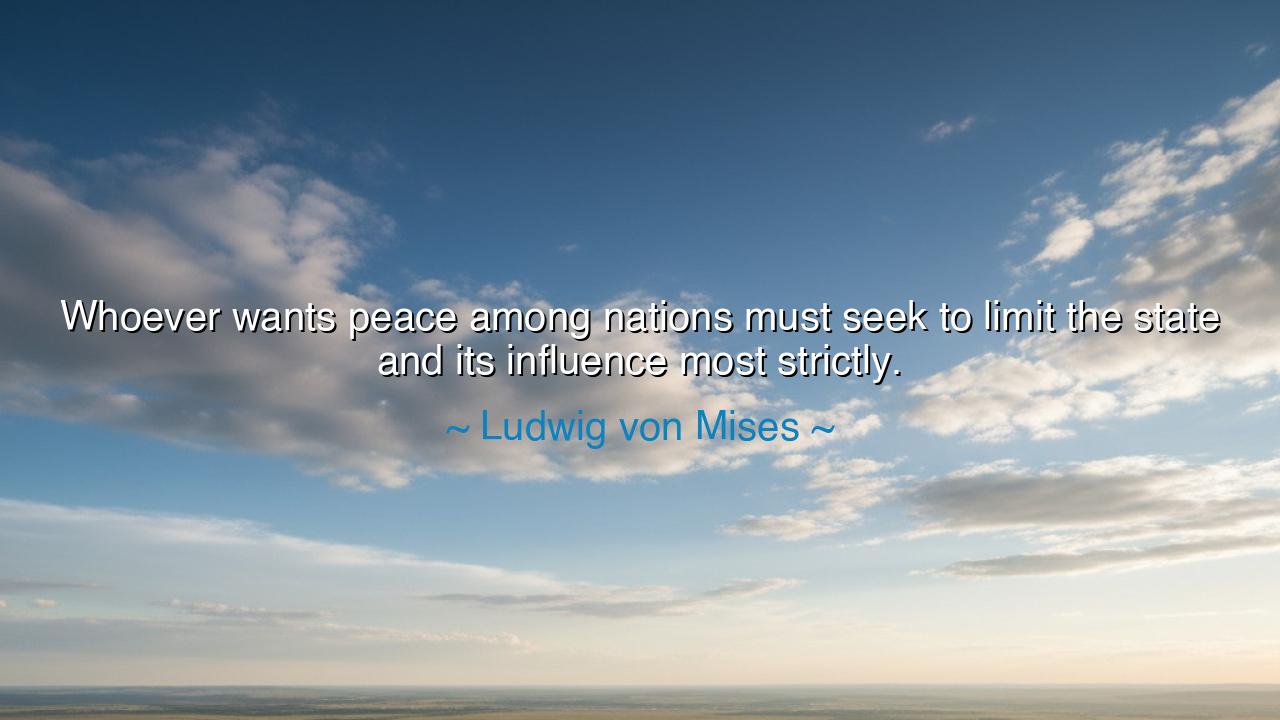
Whoever wants peace among nations must seek to limit the state
Whoever wants peace among nations must seek to limit the state and its influence most strictly.






"Whoever wants peace among nations must seek to limit the state and its influence most strictly." These words, spoken by the great thinker Ludwig von Mises, resonate with the timeless wisdom of the ancients, whose hearts beat with the same desire for peace. In his statement, von Mises implores us to understand that true peace—lasting and unshakable—can never be born in the suffocating grip of the state. Rather, it is only when the state’s influence is restricted, when the chains of power are loosened, that the seed of peace can take root and flourish.
The state, in its desire to control, to direct the affairs of men, often casts a shadow over the natural harmony that binds individuals and nations alike. It is like a great beast that looms over the land, its appetite for power never sated, its reach extending into every corner of life. Yet, as the ancients taught, peace is not found in the grip of domination, but in the freedom of individuals to govern their own destinies. The more the state grows, the more it stirs the waters of conflict, for it seeks to impose its will upon all who reside under its sway. Thus, the teachings of von Mises echo the wisdom of the Greek philosophers, who spoke of the need for freedom to flourish in order for peace to reign.
Let us turn to the story of the Roman Empire, a civilization once mighty and proud, whose expansion was driven by the hand of an ever-growing state. In its early days, the Roman Republic knew that its strength lay in the balance between individual liberty and collective action. But as the empire expanded, so too did the influence of the state. The Romans, once a people of free men, soon found themselves shackled by the vast machinery of power, and the empire crumbled under the weight of its own excess. The expansion of the state, once thought to bring peace, instead sowed the seeds of war, corruption, and decay. It is in this tragic downfall that we see the truth of von Mises’ words: peace cannot thrive where the state wields unchecked power.
But there is another lesson to be learned from the histories of the world: the rise of democracy in ancient Athens. While not free from its own flaws, Athens demonstrated a powerful truth—that when the state is limited, when it allows the individual to thrive in their own pursuit of happiness and freedom, a rare peace can be achieved. Athens, for a time, was a beacon of liberty and prosperity. It was a place where the state’s role was to serve, not dominate, and in this, the citizens were free to create, to innovate, and to live in harmony with one another. The lesson of Athens is clear: the state must be kept in check if the flame of peace is to burn brightly.
In the modern age, we find ourselves at a crossroads, for the state has grown larger, its influence more pervasive. The world is bound in a delicate balance of power, where nations vie for supremacy and peace remains a distant dream. Yet, we must heed von Mises’ wisdom, and understand that the answer does not lie in more control, but in less. If we are to see peace among nations, we must call for a world where the state’s power is limited, where it is constrained by the will of the people, and where the freedom of individuals is safeguarded above all.
What, then, is the practical action we must take? We, the people, must be vigilant. We must demand that our leaders place limits on the state's influence and prioritize the freedom and well-being of the individual. In our own lives, we must advocate for a society where governments serve the needs of the people, not their own ambitions. This is not a call to reject order, nor to embrace chaos, but a call to remember that true peace is found in freedom, and that the more we allow the state to grow, the more we invite strife and discord into our lives.
In the end, the lesson of von Mises, like the teachings of the ancients, is simple yet profound: peace is a fragile flower that cannot bloom under the weight of tyranny. We must seek to limit the state not out of hatred, but out of love for freedom, for it is only when the state’s influence is restrained that the hearts of men and women, free to pursue their own paths, can live in peace with one another. Let this wisdom guide us, that in the pursuit of peace, we may build a world where liberty reigns supreme, and the shadow of the state no longer casts its darkness upon our lives.






AAdministratorAdministrator
Welcome, honored guests. Please leave a comment, we will respond soon